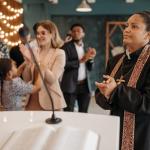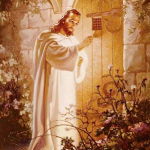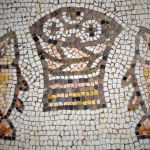Have you ever had a moment when you heard a song on the radio and a memory came rushing back?
This week I asked Carol Blythe if she had a memory of a moment marked by the singing of a particular song…of course she told me a story about one time that she and Rick and their girls were down at the Lincoln Memorial protesting one of the Iraq wars. She can’t remember which one, exactly, because, as you know, all those protests tend to run together for Carol…. One striking thing about her memory is that Peter, Paul and Mary were there playing music. When they began to sing and play “If I Had a Hammer,” she and Rick started singing at the top of their lungs, with gusto. And the most amazing thing about the whole experience was that neither of her daughters told them to lower their voices they were embarrassing them.
My song memory is not as noble as Carol’s. It was sixth grade. My little group of friends heard the news that Rick Springfield was coming to play a concert in town. His song Jesse’s Girl was all the rage in the pre-teen girl set…it is such a great song for dancing around your room singing into your hairbrush. I hoped against hope that I would get to see Rick Springfield IN PERSON, and that, of course, I would get to hear him sing Jesse’s Girl. Sadly, my mother thought I was too young to go to a rock concert and all my dreams were dashed. I can’t hear Jesse’s Girl ever again in my life without recalling that crushing, crushing disappointment.
Songs narrate our lives; they recall moments of great emotion, moments that seal themselves in our memories. These past few weeks in worship we’ve been exploring a book of songs—the Psalms, the songbook of the Hebrew people. Today’s Psalm, Psalm 126, is one of those songs that surely marked a significant moment in the lives of the Hebrew people. One commentator called it, “the poetry of the full heart.”
And, it clearly is.
In this song the people are singing about a time when God restored their fortunes, and the language they use is abundant and joy-filled—our mouth was filled with laughter, our tongues with shouts of joy! We rejoiced!
It’s true that many songs are played and sung to mark special occasions, and though it’s clear that was the case with this Psalm, nobody is quite sure exactly what occasion this Psalm marks. Scholars’ best guess is that this Psalm was somehow connected to the Hebrews’ exile in Babylon and their return to Jerusalem after years and years of being far away and longing for home.
So while we’re not exactly sure what specific occasion this Psalm marked, it’s as good a guess as any that it has something to do with the whole experience of exile. But who besides the adult Sunday School class is up on their Israeli Exilic History? That’s what I thought. So here’s a quick review for some background on just what those Hebrews might have been singing about in Psalm 126.
The Babylonian captivity, the exile, was a time in the life of ancient Israel when they were conquered by King Nebuchadnezzar and deported in three waves from the city of Jerusalem to the city of Babylon. The city of Jerusalem was reduced to rubble; the temple was completely destroyed. All of the leaders of the people were carted off to Babylon and lived in exile there for more than 50 years. It was a time of utter devastation, where the life the people knew and loved was completely destroyed. They were transplanted into a culture totally foreign to them, with language and customs they didn’t know. And worst of all, they couldn’t see the future. As the generations passed and the elderly died and children who had never even seen Jerusalem were born, the people wondered what would become of them, even as they longed with whatever memory they had for the holy city. Where was God? And when would God come to save them and restore them to the land they had been given?
The answer to those questions came in the year 538 BCE, after the Persian King Cyrus came in and took over Babylon. Cyrus gave the Jews permission to return home, to go back to the city they’d lost, to begin building it again. And, after all those years in Babylon, some of them went back.
The first half of this Psalm seems to me to be a song of joy and anticipation, perhaps sung on the long journey back to Jerusalem. Buoyed by their memories and vindicated by their trust in Yahweh to save them, they journeyed back home. If you look at this Psalm with me you can see what I mean…the Lord is restoring their fortunes…while they had had only dreams to hang onto, now their mouths were filled with laughter and their tongues with shouts of joy! Yahweh has finally come and rescued us. Now, home we go, back to the familiar, back to Jerusalem! I can imagine the caravans of travelers, lives packed up and headed slowly up toward Jerusalem, singing this song like the protest songs that Carol and Rick sing…the whole crowd swelling with anticipation, feeling the feelings of amazing deliverance.
But do you know what happened when they finally got to Jerusalem?
It was chaos there. The temple they remembered—that glorious temple painstakingly built by King Solomon as the house of Yahweh—had been utterly destroyed. The wall around the city, that critical piece of national defense, was crumbling and didn’t provide any kind of protection at all. The streets they remembered were littered with rubble and the weeds—the weeds had grown over everything. All of the infrastructure they’d built for sanitation and water and food and defense was gone. There was a small number of people still living in the rubble, and they had to now assimilate to the waves of settlers who were returning after having lived for so long in a completely different culture.
In short, it was a mess. An organizational nightmare, one might even say. Where was the city they loved? What had happened to the beautiful home of Yahweh? More importantly, how on earth were they going to organize their lives? They’d left a sophisticated society to come to a place filled with confusion and disorganization and distress.
My guess is that that’s when the second part of the Psalm got added to the singing. Their joyful expectation of God’s salvation faded away as they reached the top of the hill and saw the state of Jerusalem. And maybe that’s when they began to sing a song…of longing. With reality hitting them in the face they began to remember again how much they had longed for things to be as they were, and that longing returned: Restore our fortunes, O Lord! Turn these tears of awareness of this reality into shouts of joy again. As we pick up the pieces all around us and begin to make a life out of this utter devastation, help our efforts come to something good and life-giving. Help us, God.
We’re in a season of re-imagining our life together as the church here at Calvary, and today’s area for discussion is church structure. The Israelites were in dire straits, facing the challenge of completely starting from scratch in their efforts to organize their community. We are not standing over the dismal rubble of a ruined infrastructure like they were, but we’ve come now through five years of life together where we worked hard to build our congregation, to change the culture of our community, to learn what it means to be a church that lives out its stated mission: to be an ecumenical, multi-racial, multi-ethnic Christian body that reaches out to the world with the Good News of Jesus Christ. To that end we strive to be welcoming, responsive, trusting and prayerful in everything we do. That was fun. As we welcomed new people in and celebrated the ministry and mission that goes on here and has gone on here for 150 years, we could sing along with the Hebrews that first part of Psalm 126. We had seen God restore the fortunes of this family of faith in new and wonderful ways and, on many occasions, our mouths were filled with laughter!
Now we’ve come to the end of that five year period of intentional building, and in the weeks and months ahead we will begin looking hard at the way we organize ourselves to do the work that God has called us to do. In order to succeed, we are going to have to re-imagine our church structure. Church structure! We’re down to brass tacks now, like the Israelites upon return to Jerusalem. We’ve got some cleaning up and reorganizing to do before we are able to fully realize what God intends to do with and through us in this place.
Like many historic downtown churches, Calvary had a heyday of membership that peaked in the early 1950s. EVERYBODY went to church back then. For thousands of people to worship here as members of this church, there were occasions on which tickets were issued. And there are some of you here who can remember those days.
In order to organize the congregation’s life back then, a structure was put into place. It is a structure that worked quite well back then, but now it’s a structure that calls for many things we don’t use and can’t actually manufacture. For example, there should be, officially, a Board of 24…ushers. Nevermind all the other boards that are called for, with large numbers of members and an elaborate structure in which boards send representatives to other boards and committees and a church council runs the whole show.
We don’t have a need for a board of 24 ushers; our need for organization is very different now than it was before. These days the elaborate structure under which we still try to function can seem overwhelming and intimidating, cumbersome and difficult to navigate. Sometimes we stumble under its weight. We stand here, in our present reality, looking out over a new day with a new opportunity for organization, and it’s easy to feel discouraged. Perhaps this is not the experience of church we had envisioned. Maybe the task seems too daunting for us to take one. Probably we cannot see for sure the direction we need to move. It’s possible that like the Hebrews, our song may change a little in this new season of life together.
This week, the church council will meet together to talk about trying on a new, trial structure for the year ahead. We’ll begin to make a little bit of progress in the quest to understand how we best organize our life together. And as we do that, we may sing a new song, a song of looking out over this reality, this challenge, and having to recall for each other the grace and care of God. Restore our fortunes, O Lord! Turn this awareness of our reality into shouts of joy again. Remind us that you are at work, and that the seeds we plant now will be harvested with shouts of joy.
In the weeks and months ahead as we do the hard work of reimagining who we are and what we do in this place, like the Israelites, we would do well to sing a song of hopeful anticipation. The song we sing, I think, should be something like this beautiful prayer of Monsignor Oscar Romero, about whom so many of us have learned as we’ve traveled to El Salvador and heard about his tedious work for peace in a country torn apart by violence and war. Perhaps it can be our song in the days ahead:
It helps, now and then, to step back and take a long view. The kingdom is not only beyond our efforts, it is even beyond our vision. We accomplish in our lifetime only a tiny fraction of the magnificent enterprise that is God’s work. Nothing we do is complete, which is a way of saying that the kingdom always lies beyond us. No statement says all that could be said. No prayer fully expresses our faith. No confession brings perfection. No pastoral visit brings wholeness. No program accomplishes the church’s mission. No set of goals and objectives includes everything. This is what we are about. We plant the seeds that one day will grow. We water seeds already planted, knowing that they hold future promise. We lay foundations that will need further development. We provide yeast that produces far beyond our capabilities. We cannot do everything, and there is a sense of liberation in realizing that. This enables us to do something, and to do it very well. It may be incomplete, but it is a beginning, a step along the way, an opportunity for the Lord’s grace to enter and do the rest. We may never see the end results, but that is the difference between the master builder and the worker. We are workers, not master builders; ministers, not messiahs. We are prophets of a future not our own.Amen.















